Many years ago, keeping betta fish in a tiny vase or bowl with no filter, heater, plants, or decorations was common practice.
So, do betta fish need a filter to keep their tank clean? Yes, they do!
Thankfully, these days, responsible hobbyists know that betta fish need a proper aquarium with heating and filtration to thrive and enjoy their full life expectancy.
Read this guide to learn why betta fish need a filter and what design of filtration system is best for bettas.
Betta Fish Tanks Without Filters
A betta can live for a short period in a small tank or bowl without a filter system, and you can extend that time by carrying out frequent water changes to keep the water clean.
However, your fish won’t survive for long, and his life expectancy will be much shorter than normal.
Why?
So, a betta tank with no biological filtration will never have perfectly clean, healthy water, regardless of how often you perform water changes.
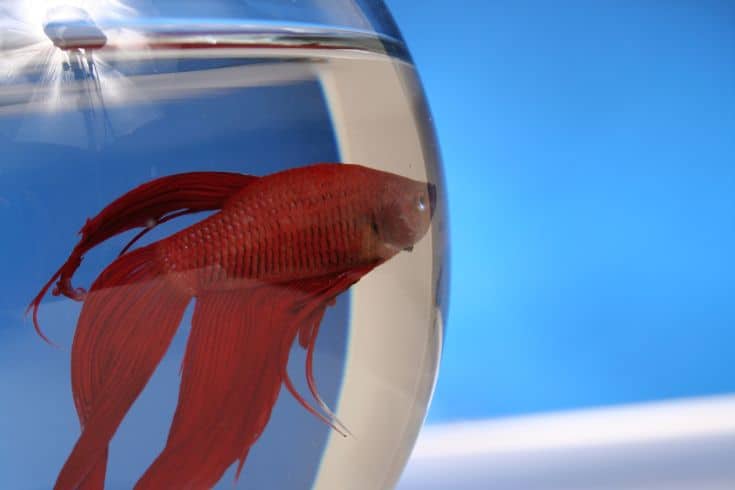
Stress
Frequent water changes will stress your fish, and the water parameters will become unstable because you remove the essential beneficial bacteria from the tank whenever you change some water.
No Flow
In a betta tank without a filter, there are no water currents to circulate the water, so dead areas of stagnation will develop. That’s not only bad for your betta, but it will stink your home out, too!
Caring For A Betta Tank Without A Filter
If you don’t have a filter for your betta tank or bowl, you must replace around 25% of the water in the container every day or two.
You should also use an aquarium vacuum cleaner to get rid of floating contaminant particles from the water.
Do Betta Fish Need A Filter?
In the betta’s natural habitat, events such as rainfall replace and clean the water in the betta’s habitat. In addition, plants take up nitrates and use CO2, helping to keep the environment safe for the fish.
The ponds, rice paddies, and marshes where bettas live have a large surface area, ensuring good gaseous exchange, so the water is well-oxygenated.
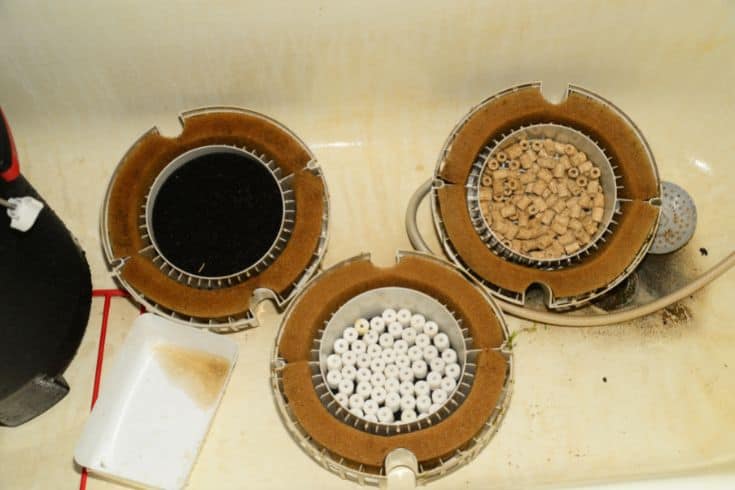
In contrast, a fish tank is a closed environment, so a filter and regular water changes are necessary to remove harmful chemicals from the water and oxygenate it so that your betta buddy can breathe.
Waste Reduction
The constant water movement provided by the filter pump helps to remove particles of solid fish waste from the water, preventing them from decomposing and helping to maintain a healthy ecosystem.
Oxygenation
The agitation of water by the filter improves gaseous exchange and boosts the levels of dissolved oxygen in the water. That also helps to prevent stagnation of the tank.
Good Bacteria
The biological element of the filter system provides a platform for various types of helpful bacteria to grow.
As part of the nitrogen cycle, Nitrosomonas bacteria turn harmful ammonia into nitrites, then Nitrobacter bacteria process nitrites into nitrates, which are less harmful to your fish.
Without adequate surface area and a good flow of oxygen-rich water, those beneficial bacteria won’t grow, and your betta’s tank will have polluted, dirty water.
Tank Mates
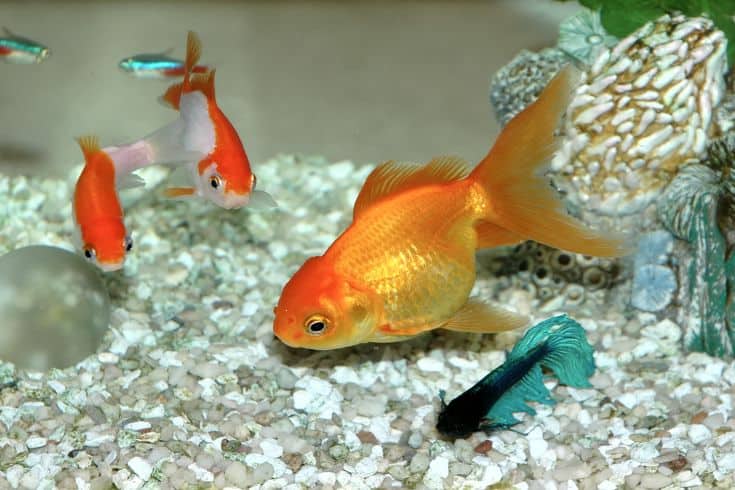
Tank mates, such as snails and shrimp, can be good company for your betta fish, as well as helping to keep the tank clean and healthy by eating general detritus, leftover fish food, and algae.
By introducing those tank mates, you can lighten the burden on your filter system.
Maintenance
Of course, a filter system takes some maintenance to keep it working efficiently.
The degree of maintenance the filter needs depends on the size of your tank and the number of fish and other livestock you have in it.
For example, I rinse the filter media for my tanks in dirty tank water once every couple of weeks to remove sludge, and I check the impeller for debris once a month or so. That ensures that the water flows freely through the unit.
Depending on your filter media, you’ll need to replace your filter media from time to time in line with the manufacturer’s recommendations.
How Do Filters Work?
Most betta tank filters contain three elements:
Mechanical Filter
The mechanical filter removes floating waste particles to keep the tank water clean and clear.
Chemical Filter
Chemical filter media typically contains activated carbon that removes heavy metals and chemicals from the water. This is an optional element that not all filter systems have.
Biological filter
The biological filter is crucial to your betta’s health and provides him with a comfortable habitat.
Beneficial bacteria grow in the biological filter media, powering the nitrogen cycle and keeping the water safe for your betta.
Types of Filters
There are several filters to choose from, although not all are suitable for bettas.
Hang-on-Back (HOB) Filters
HOB filters are designed to hang on the back of your fish tank.
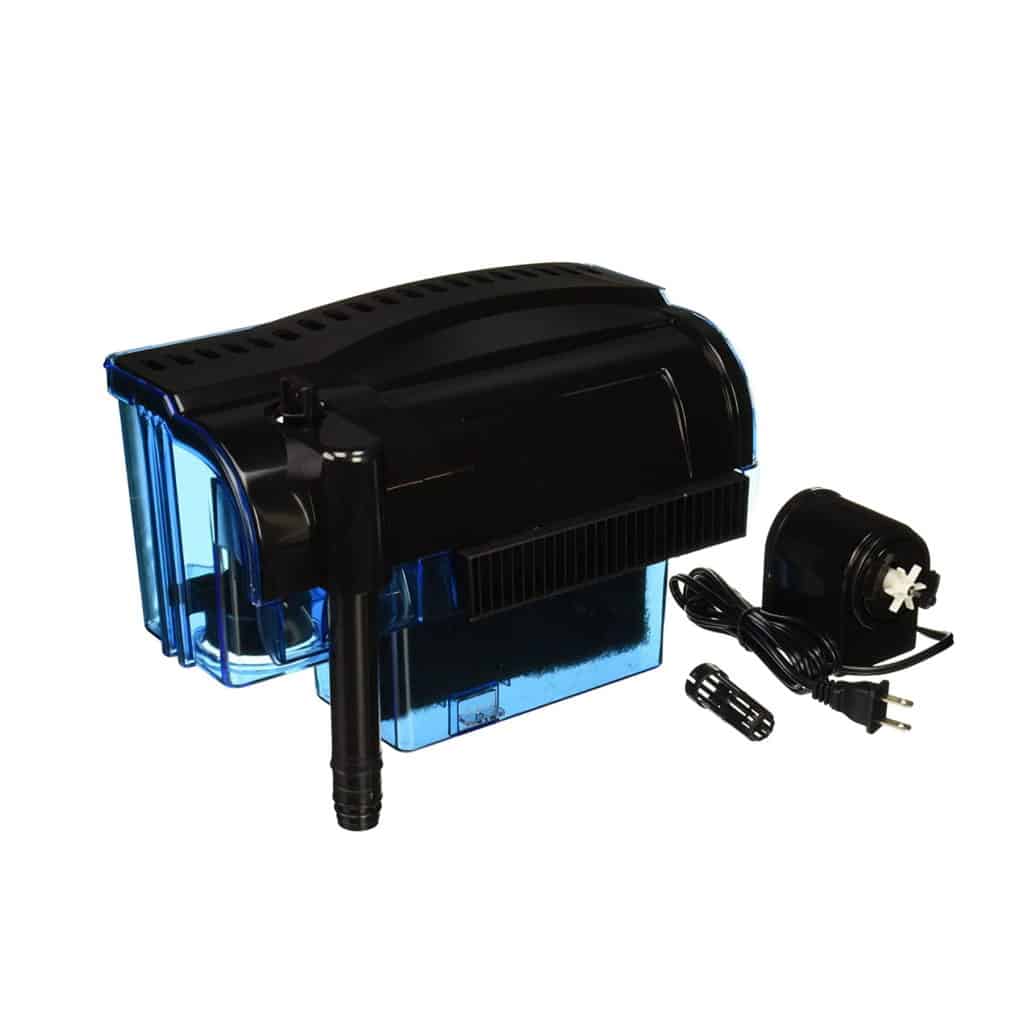
This kind of filter generally has all three elements, and most use a siphon to draw air into the water, oxygenating it. Some HOB filters use a biowheel that spins, allowing the water passing over it to come into contact with air and providing the maximum surface area for beneficial bacteria.
Unfortunately, HOB filters create a waterfall effect when the water returns to the tank, creating lots of surface agitation that could stress your betta.
Internal filters
Internal filters are fitted inside your tank and attached to the glass via suction cups.
These powerful filters usually create too much flow for bettas.
Sponge Filters
Sponge filters live inside the betta’s tank. These are an excellent option for a nano betta tank since they create a gentle current, using a single sponge as both the mechanical and biological filters.
The downsides of sponge filters are that they take up valuable space in your tank and are sometimes not powerful enough to cope in a busy tank with lots of fish.
Undergravel Filters
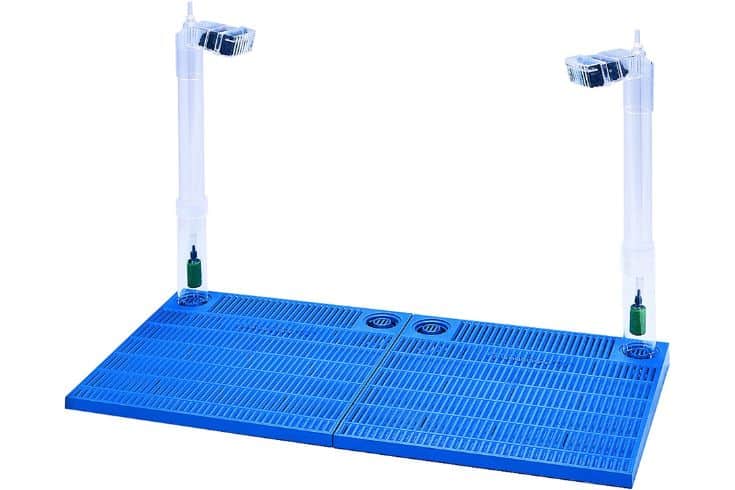
An undergravel filter requires virtually no weekly maintenance, using the substrate and filter plate as both the mechanical and biological elements.
The filter is a large plate with many slots through it. Two uplift tubes are fitted into the two rear corners of the filter plate, rising up to the surface. You use an external air pump to pull water through the filter and circulate it through the tank.
Canister Filters
A canister filter lives in your aquarium cabinet or somewhere out of site. These filters are usually used for larger tanks over 30 gallons, so it would probably be too much for a betta tank.
Canister filters take water from the aquarium and pass it through an external filter system before returning the clean water to the tank.
What Is The Best Filter For A Betta Tank?
You can buy most types of filters in most good pet shops. When choosing a filter for your betta tank, we recommend that you consider the following:
- Mechanical and biological filtration is a must-have, but do you want to include chemical filtration too?
- Is the flow gentle enough for your betta to be comfortable and not stressed? A filter with an adjustable flow rate is ideal.
- How much maintenance and cleaning does the system require? Ideally, you want a filter that’s easy and quick to clean with minimal effort and doesn’t use pricey filter cartridges.
Although some cheaper filters are available, we recommend that you choose the best quality unit you can afford. Reliability is essential when it comes to filters, and the last thing you need is for the filter to fail and put your betta at risk.
FAQs
In this part of our guide, we answer some of the most commonly asked questions about a betta fish tank with a filter.
Q: Can betta live without an air pump and filter?
A: Wild bettas live in habitats with slow-moving water, so they don’t appreciate a strong flow or too much surface agitation. Therefore, an air pump or air bubbles is not necessary. In addition, bettas regularly breathe through their labyrinth organ to supplement the dissolved oxygen they get from the water.
However, a betta tank should have a filter to remove harmful waste products from the environment to manage the tank’s bioload and keep the water safe for the fish.
Q: Can betta fish live in tap water with a filter?
A: Betta fish can live in tap water, provided it’s treated with a dechlorinator before being added to the betta’s tank.
Q: Is my filter too strong for a betta?
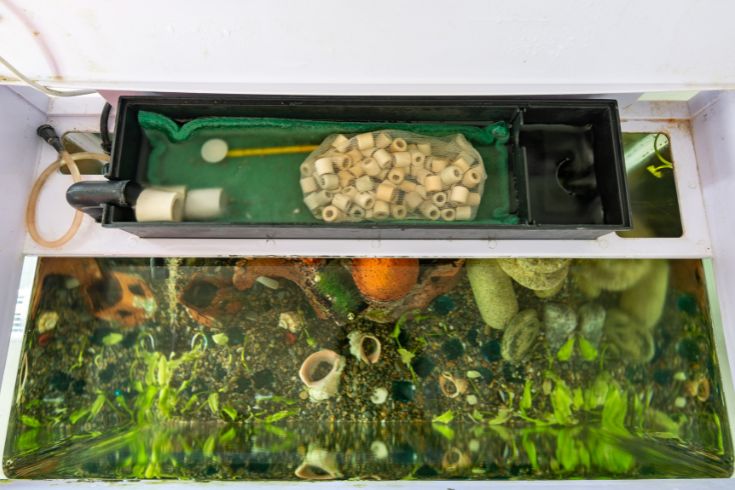
A: One problem with having such glorious, flowing finnage is that bettas struggle to swim in a tank with a strong current and prefer slow-flowing water. If your fish can’t get around easily, he’s sure to become stressed, and that could leave him vulnerable to attack by parasites and diseases.
If your pet appears to be having difficulty getting to parts of his tank or being buffeted around, your filter might be too powerful for him.
Q: Can I turn the betta filter off overnight?
A: We recommend that you run your betta tank filter 24/7/365 to ensure the water remains clean and safe for your pet.
The beneficial bacteria colonies in your filter media that process harmful waste will die if they don’t receive sufficient oxygen. So, to prevent that from happening, the flow through your tank must be continuous.
Final Thoughts
Did you enjoy our article on whether betta fish need a filter? If you did, please share it with other betta fish fans.
Ideally, betta fish should have a filter to keep their tank clean, free from toxic chemicals, and safe for your precious pet.
What kind of filter do you use for your betta? Tell us in the comments box below.